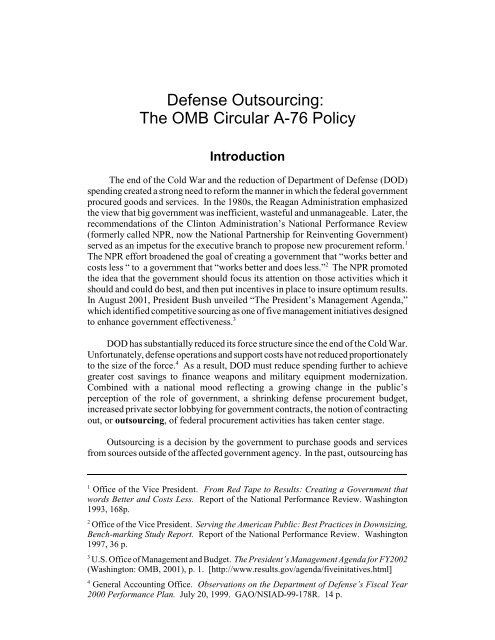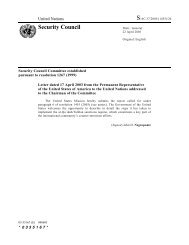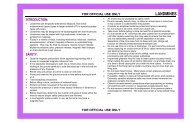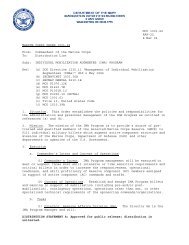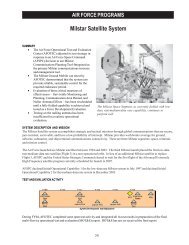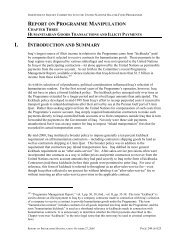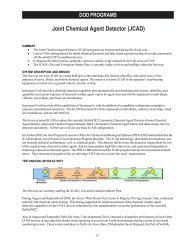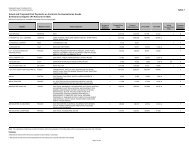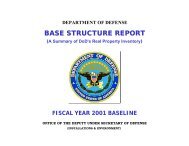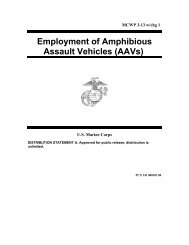The OMB Circular A-76 Policy - GlobalSecurity.org
The OMB Circular A-76 Policy - GlobalSecurity.org
The OMB Circular A-76 Policy - GlobalSecurity.org
Create successful ePaper yourself
Turn your PDF publications into a flip-book with our unique Google optimized e-Paper software.
Defense Outsourcing:<br />
<strong>The</strong> <strong>OMB</strong> <strong>Circular</strong> A-<strong>76</strong> <strong>Policy</strong><br />
Introduction<br />
<strong>The</strong> end of the Cold War and the reduction of Department of Defense (DOD)<br />
spending created a strong need to reform the manner in which the federal government<br />
procured goods and services. In the 1980s, the Reagan Administration emphasized<br />
the view that big government was inefficient, wasteful and unmanageable. Later, the<br />
recommendations of the Clinton Administration’s National Performance Review<br />
(formerly called NPR, now the National Partnership for Reinventing Government)<br />
served as an impetus for the executive branch to propose new procurement reform. 1<br />
<strong>The</strong> NPR effort broadened the goal of creating a government that “works better and<br />
costs less “ to a government that “works better and does less.” 2 <strong>The</strong> NPR promoted<br />
the idea that the government should focus its attention on those activities which it<br />
should and could do best, and then put incentives in place to insure optimum results.<br />
In August 2001, President Bush unveiled “<strong>The</strong> President’s Management Agenda,”<br />
which identified competitive sourcing as one of five management initiatives designed<br />
to enhance government effectiveness. 3<br />
DOD has substantially reduced its force structure since the end of the Cold War.<br />
Unfortunately, defense operations and support costs have not reduced proportionately<br />
to the size of the force. 4 As a result, DOD must reduce spending further to achieve<br />
greater cost savings to finance weapons and military equipment modernization.<br />
Combined with a national mood reflecting a growing change in the public’s<br />
perception of the role of government, a shrinking defense procurement budget,<br />
increased private sector lobbying for government contracts, the notion of contracting<br />
out, or outsourcing, of federal procurement activities has taken center stage.<br />
Outsourcing is a decision by the government to purchase goods and services<br />
from sources outside of the affected government agency. In the past, outsourcing has<br />
1<br />
Office of the Vice President. From Red Tape to Results: Creating a Government that<br />
words Better and Costs Less. Report of the National Performance Review. Washington<br />
1993, 168p.<br />
2<br />
Office of the Vice President. Serving the American Public: Best Practices in Downsizing,<br />
Bench-marking Study Report. Report of the National Performance Review. Washington<br />
1997, 36 p.<br />
3<br />
U.S. Office of Management and Budget. <strong>The</strong> President’s Management Agenda for FY2002<br />
(Washington: <strong>OMB</strong>, 2001), p. 1. [http://www.results.gov/agenda/fiveinitatives.html]<br />
4<br />
General Accounting Office. Observations on the Department of Defense’s Fiscal Year<br />
2000 Performance Plan. July 20, 1999. GAO/NSIAD-99-178R. 14 p.


